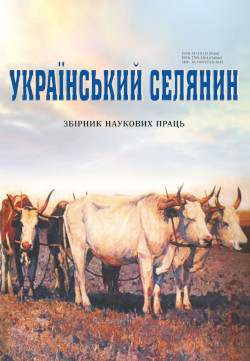Peasants of the Naddnipryanshchyna of the first third of the 20th century: perspectives and traps of formation national identity
Main Article Content
Abstract
The purpose of this article is a more detailed study of the modern transformation of the peasantry of the
Naddnipryanshchyna in the first third of the 20th century, in particular the formation of national identity in its consciousness.
Scientific novelty. Scientific novelty of the research results.Actually, the modernization of the village of Naddnipryanshchyna
in the first third of the 20th century encouraged its inhabitants to relatively speedily penetrate into their world of commoditymoney relations. Due to the needs of the time, the synthesis of the socio-economic and mental at the everyday level slowly
strengthened the deep foundations of national awakening. However, the peasantry was not able to make such a breakthrough into
the modern world. The author focused attention on the formation of national identity, taking into account the complexity of these
processes and the extremely diverse mosaic of socio-cultural interactions. Looking at it through the world of consciousness and
mentality led to an original result: the national from the main thing turned into something less significant. However, the national
did not disappear, but only optimized its dislocation. Ukrainians created a nation both mentally (ethno-cultural potential) and
consciously (ideological project). Moreover, only the in-depth interaction of the mental and the conscious guaranteed a positive
result.
The formation of the national identity of the Naddnipryanshchyna in the transitional period from the imperial to the Soviet
period took place in the conditions of violation of traditional discourses and communicative practices. It was found that the
situational context of discourses was significant, particularly their sequencing and institutionalization. The methods of targeted
and rational interaction were created to generate a sense of involvement and interaction in the villagers, they were aimed at the
transfer of information and the generation of meanings, transformation of social reality. It united and identified the peasants.
However, it was not convincing, because identity (belonging to the nation) at that time was devoid of many attributes, above all
the experience of statehood, symbols, and common values. Some of them were deliberately distorted by the Bolsheviks.
Methodology. The study was conducted on the basis of an interdisciplinary approach, which encompasses and synthesizes
both theoretical positions (epistemological paradigms) and the results of thematic explorations.
Conclusion. In the 1920s, the Bolsheviks replaced the sacred aspect of national identity with a profane one. As a result,
the formation of national identity became a trap for the peasants, but even the establishment of a totalitarian regime did
not eliminate their national perspectives. They were dependent not so much on the dominant ideology or even the social
environment, but rather on the global cultural transfer of people, ideas, technologies, and social and political movements.
Article Details

This work is licensed under a Creative Commons Attribution 4.0 International License.
References
«Nezruchnyi klas» u modernizatsiinykh proiektakh. Ukraina moderna (Bezmezhne
selo). [«Inconvenient Class» in Modernization Projects. (2010). Modern Ukraine (Boundless
village)], 6(17), 9–44. [in Ukrainian].
Babak, M., Naiden, O. & Prysiazhniuk, Yu. (2014). Silska fotohrafiia Serednoi Naddniprianshchyny kintsia XIX – XX st. [Rural Photography of the Middle Naddniprianschyna at the
end of the nineteenth – twentieth сenturies]. Kyiv : Intertehnology-Cherkasy. [in Ukrainian].
Domanska, E. (2014). w: Le Roy Ladurie Е. Montaillou. Wioska heretyków. 1294–1324 /
przełożyła E. Żółkiewska, wyd. II Posnań : Vesper. 5–23. [in Polish].
Kornovenko, S. (2017). Subiektnyi skladnyk ahrarnoho pytannia yak odna z peredumov
Ukrainskoi revoliutsii 1917–1921. [Subjective component of the agrarian question as one of
the preconditions for the Ukrainian revolution of 1917–1921]. Ukrainskyi istorychnyi zhurnal.
[Ukrainian historical journal], 4, 83–94. [in Ukrainian].
Kovalova, N. (2016). Seliany, pomishchyky i derzhava : konflikty interesiv. «Ahrarna
revoliutsiia» v Ukraini 1902–1922 rr. [Peasants, landlords, and the state : conflicts of interests.
«Agrarian Revolution» in Ukraine 1902–1922]. Dnipropetrovsk : LIRA. [in Ukrainian].
Lévy-Bruhl, L. (2010). La mentalité primitive [archive], Paris. Сoll. «Bibliothèque de
philosophie contemporaine». Rééd. Flammarion, coll. «Champs classiques». [in French].
Masnenko, V. (2001). Istorychna dumka ta natsiotvorennia v Ukraini (kinets XIX – persha
tretuna XX st.). [Historical thought and nation-building in Ukraine (end of the 19th – first third of
the 20th century)]. Kyiv ; Cherkasy : Vidlunnya-Plus. [in Ukrainian].
Oryshchenko, R. (2019). Relihiinyi svit ukrainskych selian druhoi polovyny XIX – pershoi
tretyny XX st. [The religious world of Ukrainian peasants the second half of the nineteenth – first
third of the twentieth century]. Cherkasy : Vertykal. [in Ukrainian].
Prysiazhniuk, Yu. (2007). Ukrainske selianstvo Naddniprians’kоi Ukrainy : sotsiomental’na
istoriia druhoi polovyny XIX – pochatku XX st. [Ukrainian peasantry of Dnieper Ukraine :
sociomental history of the second half of the nineteenth – early twentieth century]. Cherkasy :
Vertykal. [in Ukrainian].
Schopenhauer, А. Preisschrift über die Freiheit des Willens. URL : https://www.ernster.
com/annot/04446.p [in German].
Shanin, T. (1972). The Awkward Class : Political Sociology of Peasantry in a Developing
Society : Russia, 1910–1925. Oxford : Clarendon Press. [in English].
Wilson, A. (2004). Ukraintsi : nespodivana natsiia. [The Ukrainians : Unexpected Nation].
Кyiv : К.І.S. [in Ukrainian].
Zhadan, I. V. Komunikatyvni praktyky yak chynnyk hromadianskoi i natsionalnoi samoidentyfikatsii : teoretyko-metodolohichni zasady doslidzhennia. [Communicative practices as a factor
of civil and national self-identification : theoretical and methodological foundations of research].
Retrieved from https://lib.iitta.gov.ua/708548/1/Zhadan.pdf. [in Ukrainian].

